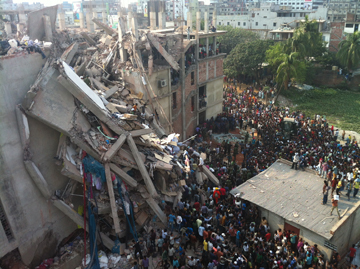WELCOME TO THE ARCHIVE (1994-2014) OF THE MAQUILA SOLIDARITY NETWORK. For current information on our ongoing work on the living wage, women's labour rights, freedom of association, corporate accountability and Bangladesh fire and safety, please visit our new website, launched in October, 2015: www.maquilasolidarity.org
June 19, 2013
 It took the worst industrial disaster in the history of Bangladesh to move global apparel companies to take serious action, but some good may come out of the April 24 Rana Plaza building collapse that killed over 1,100 workers and injured over 1,000 more.
It took the worst industrial disaster in the history of Bangladesh to move global apparel companies to take serious action, but some good may come out of the April 24 Rana Plaza building collapse that killed over 1,100 workers and injured over 1,000 more.
More than 70 international retailers and brands have signed the groundbreaking Accord for Fire and Building Safety in Bangladesh with the Global Unions IndustriALL and UNI .
Four labour rights NGOs – the Clean Clothes Campaign (CCC), International Labor Rights Forum (ILRF), Maquila Solidarity Network (MSN), and Worker Rights Consortium (WRC) – that have been campaigning for safe workplaces in Bangladesh for nearly a decade signed as witnesses.
Unlike a voluntary code of conduct and secretive, company-controlled factory audits, the Accord is a legally-binding and enforceable agreement that requires signatory companies to collaborate on a comprehensive safety program that includes:
Although most of signatory companies are based in Europe, four North American companies – PVH (owner of Tommy Hilfiger and Calvin Klein brands), Abercrombie & Fitch, Sean John Clothing, and Canada’s Loblaw (owner of Joe Fresh brand) – have also signed the Accord.
Other major North American buyers from Bangladesh, including Walmart and Gap, are stubbornly refusing to join forces with their European counterparts.
As the Accord moves to the implementation stage, the outstanding issue of compensation for the victims of Rana Plaza disaster is still under negotiation. To date, six companies whose products were made in one of the five factories housed in the eight-story building have agreed to provide some compensation to the families of those who were killed and/or the workers who were injured.
Of those, only Primark and Loblaw have promised to provide compensation in line with the calculations of Bangladeshi union federations.
The Rana Plaza building collapse was only the latest in a series of preventable factory fires and building collapses that have taken the lives of over 1,700 workers since 2005. In that year, the Spectrum factory, located in another illegal multi-story building, collapsed killing 64 workers and injuring 74.
In both the Spectrum and Rana Plaza cases, large cracks were found in the structure of the buildings prior to the collapse, but workers were forced to go to work despite the obvious dangers. In the numerous factory fires that have taken place since 2005, exits were locked or blocked or there were no external fire exits. Workers who had to jump from windows to escape the flames either died or were seriously injured.
As was the case in other factory disasters in Bangladesh, many of the brands and retailers whose products were made in the Rana Plaza building initially denied having any connection to the factories.
Walmart Canada, whose name was listed as a client on the website of one of the factories in the Rana Plaza building, initially denied that any “authorized” production was done in the facility. However, when shipping documents were also found in the rubble, indicating that Walmart products were made in the factory in 2012, the company revised its story, stating that none of its products were being made in the factory at the time of the building collapse.
Loblaw, however, was in no position to deny its relationship to the factory, since its Joe Fresh label was found in the rubble among the bodies of the garment workers who had been making their products.
To its credit, Loblaw has accepted its share of responsibility to the workers who died or were injured in the Rana Plaza building collapse, and has been the only Canadian company to sign the Accord to date.
The question remains, will other North American companies follow their lead?